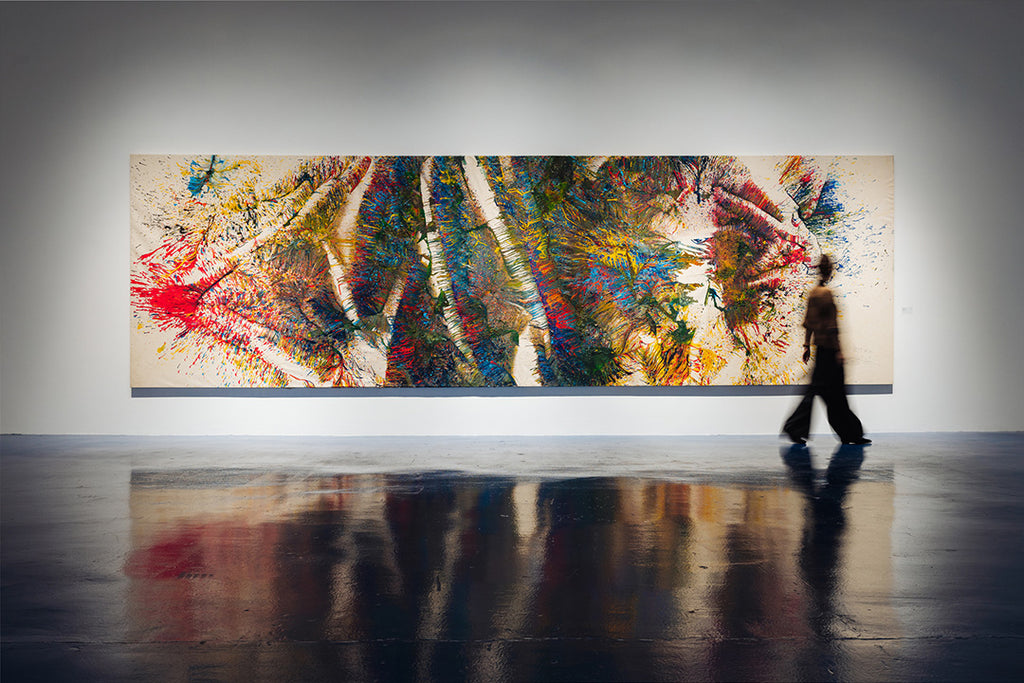ARTICLES
“Into the Unknown World — GUTAI: Differentiation and Integration” at the Nakanoshima Museum of Art and the National Museum of Art
2022.10.19
ART NEWS

“Into the Unknown World — GUTAI: Differentiation and Integration” Poster
The Nakanoshima Museum of Art and the National Museum of Art in Osaka will hold a jointly planned exhibition, “Into the Unknown World — GUTAI: Differentiation and Integration”.
Nakanoshima Museum (opened in February 2022) and National Museum are located face to face across the street. In 2022, the 50th anniversary of the dissolution of the Gutai Art Association (Gutai) exhibition are held simultaneously at the two museums as an unprecedented event of its kind.

Yoshihara Jiro, Untitled, 1962, Museum of Contemporary Art, Tokyo
What is Gutai?
The Gutai Art Association (Gutai) was a collective of artists established in Ashiya (Hyogo Prefecture, close to Osaka) in 1954. Painter Jiro Yoshihara (1905-72) was the central figure in the association. Through painting and a variety of other practices, the Gutai artists set out to express themselves freely without being confined to existing precedents. Today, Gutai is regarded as origin of Post-war Japanese art, also known as almost like a legend of that period and has finally attained national and international prominence that it deserves.

Kazuo Shiraga, Tenbousei Ryoutouda (work inspired by Chinese novel Shui Hu Zhuan) , 1962, The National Museum of Modern Art, Kyoto
This exhibition takes a fresh look at Gutai's trajectory from two perspectives: differentiation and integration. This approach has some commonalities with the Gutai attitude of attempting to be a coherent collective while individually producing different work that does not fall into the trap of imitating someone else's art. This follows Yoshihara's view that art should ideally involve the human spirit and matter shaking hands but remaining apart.

Jiro Yoshihara, Work C, 1971, Nakanoshima Museum of Art, Osaka
The two venues for this exhibition are located on the island of Nakanoshima in central Osaka, making this the first major Gutai exhibition to take place where Gutai established the Gutai Pinacotheca, its studio and exhibition space. Nakanoshima Museum focuses on the "differentiation" of Gutai, exploring the individual creativity of its artists, while the National Museum focuses on Gutai's "integration," following the undulations of the collective's experimental course. This combination of differentiation and integration results in a new understanding of Gutai which included both male and female artists. Presented in 2022, fifty years on from the dissolution of Gutai, this exhibition provides a timely examination of what happened when they set out "into the unknown world.
Differentiation—Nakanoshima Museum of Art, Osaka
Gutai has always had a reputation for innovation and creativity. Jiro Yoshihara's succinct exhortation to "Do what no-one has done before!" has come to symbolize that approach. The phrase is often quoted, but but the true details of Gutai's innovation and creativity are not generally known.
Taking up the theme of differentiation, Nakanoshima Museum extracts some of the elements of the art produced by Gutai artists, and examines in detail how they apply in the individual practices.
At this venue, the aim is not simply to show that Gutai was diverse. Taking the diversity as given, it attempts to investigate the essence of Gutai as a group by bringing out the range of art that achieved acceptance, making the extent of that diversity as visible as possible.

Atsuko Tanaka, Electric Dress, 1956/86, Takamatsu Art Museum, Photograph: Shigefumi Kato ⒸKanayama Akira and Tanaka Atsuko Association
Integration—The National Museum of Art Osaka
Gutai was initially a group of painters. And although the visual art practices of its artists became increasingly varied as time went by, tracing each practice back to its roots demonstrates that it was the result of aiming to become free of the constraints imposed by the conventions of painting. The issue was how to break down and reconstruct the painterliness of art. The novelty of the results depended on how painting (or painterliness) was understood, and whether attempts were made to produce paintings or pictures after breaking down the painterliness.
At the National Museum of Art, the exhibition looks at the course taken by Gutai from a macroscopic standpoint, attempting to identify trends in the various inquiries conducted by the Gutai artists. Gutai was not necessarily a monolithic entity, but the main aim here is to bring out the differences and attempt to integrate them into a unified whole.

Yuko Nasaka, Work, 1960, Synthetic resin paint, plywood, cotton cloth, The Miyagi Museum of Art
Information about the Exhibition
Dates: October 22 – January 9, 2022
Closed on Mondays (except January 2, January 9). Closed on December 31, January 1
Opening hours: 10:00–17:00 (last entry 16:30)
Venue: Nakanoshima Museum of Art, Osaka 5F Galleries
Organizer: Nakanoshima Museum of Art, Osaka, The National Museum of Art, Osaka, The Asahi Shimbun, MBS
Admission fee Adults:
Double admission (includes admission to NMAO), 2500 yen
Nakanoshima Museum of Art, Osaka 1,400 yen (1,200 yen)
National Museum of Art, Osaka 1,200 yen (1,000yen)

Takesada Matsutani, La Propagation 65-24, 1965, The National Museum of Art, Osaka

Saburo Murakami, Work, 1957, Ashiya city Museum of Art & History ©MURAKAMI Tomohiko

Tsuruko Yamazaki, Work, 1960, oil on enamel on canvas, The National Museum of Art, Osaka

Shozo Shimamoto, 1962-1, 1962, oil resin paint and glass on canvas, The Nakanoshima Museum of Art, Osaka

Senkichiro Nasaka, Work, 1970ca, stainless steel, The Miyagi Museum of Art

Toshio Yoshida, SPRAY, 1961, Takamatsu Art Museum
Related event: International Sky Festival
Nakanoshima Museum of Art, Osaka recreates, with new content, the International Sky Festival presented by the Gutai Art Association in 1960.
For more information and updates on the exhibition, please visit the museum's official website.



